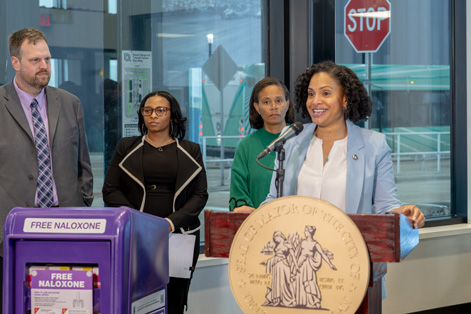|
|
|
|
|
|
 |
|
|
Denise
Fair
Razo,
Chief
Public
Health
Officer,
emphasized
the
urgency
and
innovation
driving
the
program,
calling
it a
“critical
step” in
saving
lives
and
empowering
residents. |
|
|
Detroit
Tackles
Opioid
Crisis
with
Harm
Reduction
Wellness
Stations
Dr.
Edgar
Williams
-
Primary
Care
Tell Us
Detroit
DETROIT
- In
response
to the
opioid
epidemic,
the
Detroit
Health
Department
has
launched
an
innovative
program
to save
lives
and
enhance
community
health.
The
initiative
involves
the
deployment
of 25
Harm
Reduction
Wellness
Stations
across
Detroit,
funded
by
$250,000
from
opioid
settlement
proceeds.
These
stations
provide
free
harm
reduction
resources
designed
to
prevent
fatal
overdoses,
reduce
the
spread
of
infectious
diseases,
and
promote
sexual
health.
Resources
Available
The
stations
offer
critical
supplies
tailored
to the
needs of
each
location,
including:
Naloxone
(Narcan)
kits for
reversing
opioid
overdoses.
Fentanyl
test
strips
to
identify
the
presence
of the
deadly
opioid
in
drugs.
Medication
deactivation
pouches
to
dispose
of
unused
medications
safely.
Sexual
health
supplies
such as
condoms,
Plan B,
and oral
contraceptives.
By
ensuring
year-round
access
to these
resources,
the city
aims to
empower
residents
in
protecting
their
health
and
well-being.
Strategic
Placement
To
maximize
impact,
the
stations
are
installed
in
high-risk
neighborhoods
and
high-traffic
areas.
These
include
transit
centers,
community
hubs,
motels,
gas
stations,
and
apartments—locations
identified
through
overdose
hotspots
and
data-driven
strategies.
For
example,
vending
machines
have
been
placed
at the
Jason
Hargrove
Transit
Center
and the
Rosa
Parks
Transit
Center,
while
newsstands
can be
found at
sites
like
Capuchin
Soup
Kitchens
and
Motor
City
Liquor.
Countertop
units
are also
available
at
places
such as
the
Cabana
Motel
and
Careland
Pharmacy.
A
Collaborative
Effort
The
first
phase of
installation
has
already
seen 15
Narcan
newspaper
stands,
2
vending
machines,
and 2
countertop
units
deployed.
Local
organizations
and
agencies
are
actively
collaborating
with the
Health
Department
to
ensure
the
program's
success.
Leadership
Statements
Detroit
leaders
have
highlighted
the
importance
of this
initiative
in
addressing
the
city's
public
health
challenges:
Denise
Fair
Razo,
Chief
Public
Health
Officer,
emphasized
the
urgency
and
innovation
driving
the
program,
calling
it a
“critical
step” in
saving
lives
and
empowering
residents.
Mayor
Duggan
reaffirmed
the
city’s
commitment
to
reducing
overdose
deaths
and
supporting
recovery,
describing
the
initiative
as a
vital
component
in
tackling
the
opioid
epidemic.
This
ongoing
effort
reflects
Detroit's
dedication
to harm
reduction
and
fostering
healthier
communities.
By
providing
accessible
resources
and
support
systems,
the city
is
delivering
a
lifeline
to
individuals
in need
while
addressing
broader
public
health
concerns.
|
|
|
|
|
|
|
|
|